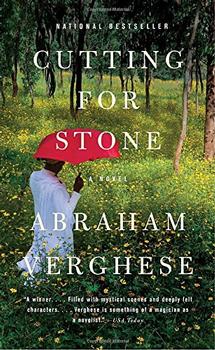Summary | Excerpt | Reading Guide | Reviews | Beyond the Book | Readalikes | Genres & Themes | Author Bio

I chose the specialty of surgery because of Matron, that steady presence during
my boyhood and adolescence. “What is the hardest thing you can possibly do?” she
said when I went to her for advice on the darkest day of the first half of my
life. I squirmed. How easily Matron probed the gap between ambition and
expediency. “Why must I do what is hardest?”
“Because, Marion, you are an instrument of God. Don’t leave the instrument
sitting in its case, my son. Play! Leave no part of your instrument unexplored.
Why settle for ‘Three Blind Mice’ when you can play the ‘Gloria’?”
How unfair of Matron to evoke that soaring chorale which always made me feel
that I stood with every mortal creature looking up to the heavens in dumb
wonder. She understood my unformed character.
“But, Matron, I can’t dream of playing Bach, the ‘Gloria’ ... ,” I said under
my breath. I’d never played a string or wind instrument. I couldn’t read music.
“No, Marion,” she said, her gaze soft, reaching for me, her gnarled hands rough
on my cheeks. “No, not Bach’s ‘Gloria.’ Yours! Your ‘Gloria’ lives within you.
The greatest sin is not finding it, ignoring what God made possible in you.”
I was temperamentally better suited to a cognitive discipline, to an
introspective field—internal medicine, or perhaps psychiatry. The sight of the
operating theater made me sweat. The idea of holding a scalpel caused coils to
form in my belly. (It still does.) Surgery was the most difficult thing I could
imagine.
And so I became a surgeon.
Thirty years later, I am not known for speed, or daring, or technical genius.
Call me steady, call me plodding; say I adopt the style and technique that suits
the patient and the particular situation and I’ll consider that high praise. I
take heart from my fellow physicians who come to me when they themselves must
suffer the knife. They know that Marion Stone will be as involved after the
surgery as before and during. They know I have no use for surgical aphorisms
such as “When in doubt, cut it out” or “Why wait when you can operate” other
than for how reliably they reveal the shallowest intellects in our field. My
father, for whose skills as a surgeon I have the deepest respect, says, “The
operation with the best outcome is the one you decide not to do.” Knowing when
not to operate, knowing when I am in over my head, knowing when to call for the
assistance of a surgeon of my father’s caliber—that kind of talent, that kind of
“brilliance,” goes unheralded.
On one occasion with a patient in grave peril, I begged my father to operate. He
stood silent at the bedside, his fingers lingering on the patient’s pulse long
after he had registered the heart rate, as if he needed the touch of skin, the
thready signal in the radial artery to catalyze his decision. In his taut
expression I saw complete concentration. I imagined I could see the cogs turning
in his head; I imagined I saw the shimmer of tears in his eyes. With utmost care
he weighed one option against another. At last, he shook his head, and turned
away.
I followed. “Dr. Stone,” I said, using his title though I longed to cry out,
Father! “An operation is his only chance,” I said. In my heart I knew the chance
was infinitesimally small, and the first whiff of anesthesia might end it all.
My father put his hand on my shoulder. He spoke to me gently, as if to a junior
colleague rather than his son. “Marion, remember the Eleventh Commandment,” he
said. “Thou shall not operate on the day of a patient’s death.”
I remember his words on full-moon nights in Addis Ababa when knives are flashing
and rocks and bullets are flying, and when I feel as if I am standing in an
abattoir and not in Operating Theater 3, my skin flecked with the grist and
blood of strangers. I remember. But you don’t always know the answers before you
operate. One operates in the now. Later, the retrospectoscope, that handy tool
of the wags and pundits, the conveners of the farce we call M&M—morbidity and
mortality conference—will pronounce your decision right or wrong. Life, too, is
like that. You live it forward, but understand it backward. It is only when you
stop and look to the rear that you see the corpse caught under your wheel.
Excerpted from Cutting for Stone by Abraham Verghese Copyright © 2009 by Abraham Verghese. Excerpted by permission of Knopf, a division of Random House, Inc. All rights reserved. No part of this excerpt may be reproduced or reprinted without permission in writing from the publisher.
The third-rate mind is only happy when it is thinking with the majority. The second-rate mind is only happy when it...
Click Here to find out who said this, as well as discovering other famous literary quotes!
Your guide toexceptional books
BookBrowse seeks out and recommends the best in contemporary fiction and nonfiction—books that not only engage and entertain but also deepen our understanding of ourselves and the world around us.